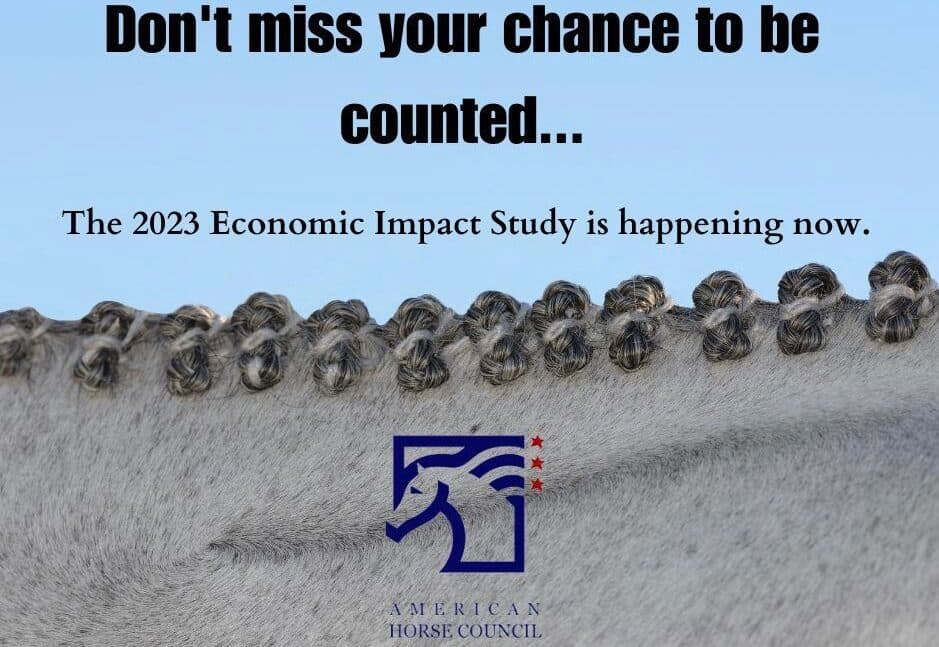Horse Owners Urged to Participate in Economic Impact Study for the Equine Industry

The last three years have been a time of great change throughout the country for homes, businesses and industries. Rising costs of living, shrinking of assistance and changes in demographics have affected so much of our world, and that includes the equine industry.
However, not all of the changes are easy to identify. This is why the American Horse Council (AHC), together with the U.S. Equestrian Federation, has kicked off what could be one of the biggest studies in more than 50 years with the 2023 National Economic Impact Study (EIS) for the equine industry.
An economic impact study examines the effect of an event or industry has on the economy and usually measures changes in business revenue, business profits, personal wages, and/or jobs. As a large, economically diverse industry, the United States horse industry contributes significantly to the American economy—more than $50 billion in direct economic impact in 2017. The study will also break off to look at certain states, horse breeds, and sectors.
The purpose of the census is to demonstrate the value of the equine industry in the national and state economies by analyzing the direct, indirect, and induced economic impacts of horse ownership, recreation, and equine-related services.
“The American Horse Council’s National Economic Impact Study is an opportunity to measure the impact that horses and equestrian sport has on the U.S. economy,” said USEF President Tom O’Mara. “This study hasn’t been conducted since 2017, so this year’s study is a very anticipated update. It’s critical that this survey provides the most comprehensive and accurate representation of our equestrian community, and that’s why we’re encouraging all of our members and fans to participate at horsecouncil.org.”
Over the course of its 50-plus year history, the AHC has conducted numerous national economic impact studies for the U.S. horse industry. “The challenges of the last few years with the pandemic and its economic impacts on all aspects of our industry make the 2023 study all that more important and necessary,” said Dr. Rick Mitchell, Chairman of the AHC Board.
Data collected will inform public and private investments in equine-related businesses, equine health care, education, land use decisions, tax policy, tourism, employment incentives, etc.
O’Mara noted, “I know we all have a lot on our plates and many emails to work through daily, but for equestrians, this one is important. Because of this, the survey will stay open from April 3 through September 29, and is completed entirely online. You can start and save and come back later. As an extra incentive, you can be registered to be eligible for some great prizes for participating.”
New this year are sponsored incentives for individuals and groups who participate in the survey, including a John Deere Z545R ZTrak Mower valued at $7500, one year of Nutrena feed for one horse (a $2,000 value); one year of Purina feed for one horse (a $500 value/horse); gift certificates from Trafalgar Square Books (total value $180); enrollment in Texas A&M AgriLife Equine Reproductive Management Online Course valued at $300/enrollment; plus more.
"The Economic Impact Study is the most effective tool in our advocacy quiver,” said Julie Broadway, president of the AHC. “When the industry needs to take aim at an issue, this data is invaluable in helping us paint the picture of the contributions the industry makes and the breath and depth of its composition."
More information and the 2023 Economic Impact Study can be found on the AHC website: horsecouncil.org/economic-impact-study/
If you have questions, contact American Horse Council President Julie Broadway at [email protected]
About the American Horse Council
As the national association representing all segments of the horse industry in Washington, D.C., the American Horse Council works daily to represent equine interests and opportunities.














